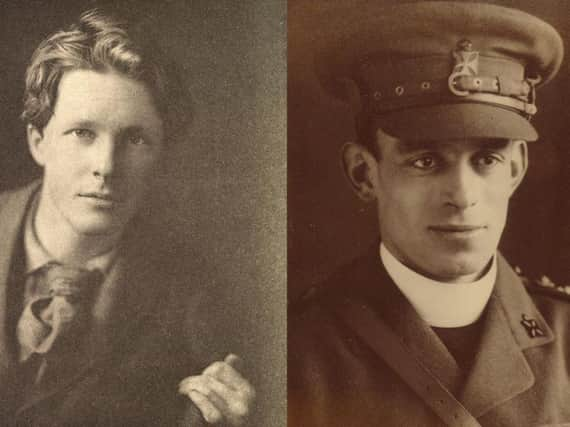Rupert Brooke and Woodbine Willie, two Rugby war heroes and their stories


Now, almost a hundred years since the Armistice, we remember two famous sons of Rugby who, through serving their country and their town, left a profound mark on history.
Rugby’s beloved poet Rupert Brooke was one of those men. His ferociously patriotic poetry at the beginning of the war is widely known.
In his 1915 Sonnet, The Soldier, he writes:
"If I should die, think only this of me:
Advertisement
Hide AdAdvertisement
Hide AdThat there’s some corner of a foreign field That is for ever England.
There shall be In that rich earth a richer dust concealed;
A dust whom England bore, shaped, made aware,
Gave, once, her flowers to love, her ways to roam,
A body of England’s, breathing English air,
Washed by the rivers, blest by suns of home."
Rugby historian Nigel Stanley said Brooke’s poems echoed the optimistic spirit in the country at the time.
As grand ideas of patriotism and belief in one’s country withered in the face of grinding, industrial war, the man who had written such beautiful poetry joined over a million other men from Britain and its Empire who would never come home.
He died in 1915 when, while taking part in the war against Turkey, a mosquito bite to his lip became infected.
Advertisement
Hide AdAdvertisement
Hide AdBrooke’s prose stands in stark contrast to the later work of poets like Wilfred Owen – whose visceral accounts of warfare still have the power to shock today.
Owen’s exposition of the trauma of war, combined with his increased cynicism as to the worth of fighting in it, serve as a reminder that for many, faith in the old institutions and patriotic trust were also casualties of the war.
In one of his most famous wartime pieces, Dulce et Decorum Est, Owen wrote:
"If in some smothering dreams, you too could pace
Behind the wagon that we flung him in,
And watch the white eyes writhing in his face,
His hanging face, like a devil’s sick of sin;
If you could hear, at every jolt, the blood
Come gargling from the froth-corrupted lungs,
Obscene as cancer, bitter as the cud
Of vile, incurable sores on innocent tongues,—
My friend, you would not tell with such high zest
To children ardent for some desperate glory,
The old Lie: Dulce et decorum est
Pro patria mori."
Another famous son of Rugby shows us that, amid the collapse of many grand old ideas, faith and humanity endured.
Advertisement
Hide AdAdvertisement
Hide AdA former curate of Rugby's St Andrew's, Studdert Kennedy volunteered as an Army Chaplain in 1915.
He spent nearly all of his entire wartime wages on cigarettes for sick and injured troops.
He often ventured, with no weapon, into No Man’s Land, in many cases while under machine gun and artillery fire, to give dying troops one last “gasper”.
The ‘Battlefield Saint’ would whisper the Lord’s Prayer and hold their hands until the end. His selfless bravery earned him a Military Cross and the affectionate, lasting nickname, ‘Woodbine Willie’.
Advertisement
Hide AdAdvertisement
Hide AdDr Parker, the author of A Seeker After Truths: The Life and Times of G. A. Studdert Kennedy (Woodbine Willie) 1883-1929, said: “Studdert Kennedy was one of the First World War’s true heroes – a courageous and selfless Christian who gave away everything he had for the benefit of others.
“With the exception of his family’s annual living expenses, he spent the rest of his salary – his family’s entire income, really – on the men he took under his spiritual wing.
“He filled his backpack with Woodbines, Bibles and a great deal of love.”
The former curate of St Andrew’s Church was initially supportive of the war, but he became a pacifist after seeing the horrors it brought.
Advertisement
Hide AdAdvertisement
Hide AdMr Stanley said: "As war progressed, he became a pacifist and Christian Socialist. While Brooke had romanticised about war in his poems in 1914, Studdert Kennedy’s war-poetry was more gritty and down-to-earth, reflecting the changed British mood after losses on the Somme in 1916.
"Both men believed in self-sacrifice: Brooke in service of his country, but Woodbine Willie in service of humanity.
"Brooke was buried on a beautiful but remote hillside on a Greek island, but when Woodbine Willie died exhausted in 1929 on a national speaking tour, aged 45, the streets were lined by thousands at his funeral, a tribute paid to few English churchmen.
"Rupert Brooke’s romantic vision of England was a casualty of the war, but Woodbine Willie’s faith in a shared future had survived."